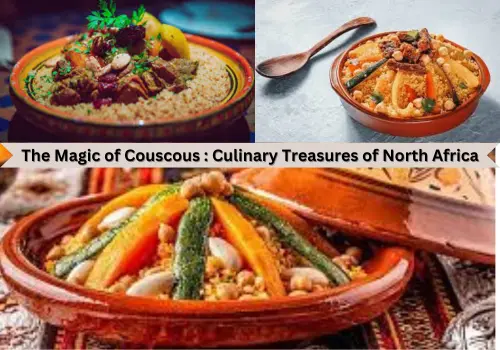Welcome to a delightful exploration of Couscous, a staple dish that has been a cornerstone of North African cuisine for centuries. This journey will take you through its rich history, diverse preparation methods, and the cultural significance it holds in countries like Morocco, Algeria, Tunisia, and Libya.
Couscous : A Culinary Journey Through North Africa-
History and Origins
Couscous, also known as cuşcuş, traces its origins back to the Berber people of North Africa. It has been a dietary staple in the region long before the Arab conquests. Over time, it spread across the Mediterranean and gained popularity worldwide.
Types of Couscous
There are primarily two types of couscous:
- Moroccan Couscous: Smaller granules, often used in traditional Moroccan dishes like couscous with lamb or vegetables.
- Lebanese Couscous (Moghrabieh): Larger granules, commonly used in Middle Eastern salads and stews.
Nutritional Value
Couscous is not only delicious but also nutritious. A one-cup serving of cooked couscous contains approximately 36 grams of carbohydrates, 6 grams of protein, and 2 grams of fiber. It is low in fat and cholesterol-free, making it a healthy choice for a balanced diet.
Culinary Uses
Couscous is incredibly versatile. It can be served as a side dish, mixed with vegetables and herbs, or used as a base for salads and main courses. In Moroccan cuisine, it is often paired with tagines, slow-cooked stews made with meat and vegetables. Spices like cumin, coriander, and cinnamon are commonly used to enhance its flavor.
Preparation Techniques
Traditionally, couscous is steamed in a special pot called a couscoussier, which has two compartments: a bottom pot for stewing meat and vegetables, and a perforated top pot for steaming the couscous. However, it can also be prepared using a regular steamer or by simply pouring boiling water or broth over the granules and letting them absorb the liquid.
Health Benefits
Apart from its nutritional value, couscous offers several health benefits. It is a low-calorie food that can aid in weight management when consumed as part of a balanced diet. The fiber content promotes digestive health and can help prevent constipation. Additionally, couscous is a good source of selenium, an essential mineral that acts as an antioxidant and supports immune function.
Conclusion
Couscous is more than just a dish; it is a symbol of North African heritage and culinary artistry. From its ancient Berber origins to its modern-day global popularity, couscous has remained a beloved staple, celebrated for its versatility, nutritional benefits, and rich flavors. Whether enjoyed as a simple side or a hearty main course, couscous continues to bring people together, offering a taste of North Africa’s vibrant culture and traditions. So, next time you savor a plate of couscous, remember the centuries of history and the diverse cultures that have contributed to this culinary gem.
FAQs
Q: What is couscous made from?
A: Couscous is made from semolina wheat, which is rolled into tiny granules and then steamed until fluffy and light.
Q: How is Moroccan couscous different from Lebanese couscous?
A: Moroccan couscous has smaller granules and is typically used in traditional Moroccan dishes, while Lebanese couscous, also known as moghrabieh, has larger granules and is used in Middle Eastern salads and stews.
Q: What are some common dishes that use couscous?
A: Couscous is often paired with tagines in Moroccan cuisine, mixed with vegetables and herbs, or used as a base for salads and main courses.
Q: Is couscous healthy?
A: Yes, couscous is low in fat, cholesterol-free, and provides essential nutrients like protein and fiber. It is also a good source of selenium, which supports immune function.
“For an intimate look into the life and legacy of [Famous Individual’s], subscribe to our portal. Explore the captivating stories that have shaped [his/her] journey and follow the unfolding chapters of [his/her] remarkable life. Delve deeper into the experiences that define [his/her] impact on the world. For exclusive updates and insights, connect with us on Instagram. Click [here] to stay connected and be a part of the extraordinary narrative that is [Famous Individual’s Name]. Also you can visit our another website which includes cricket latest news [click here].”






